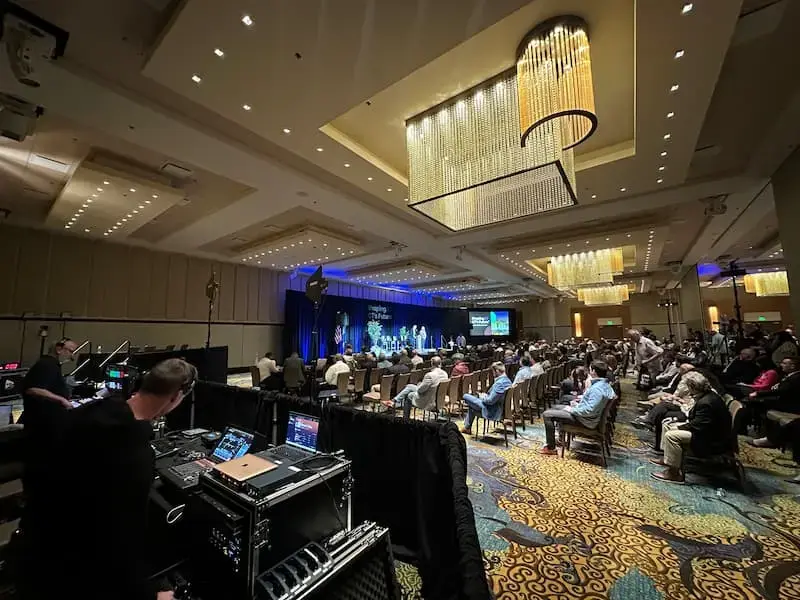Corporate events are an opportunity for your entire company, organization, team, or service department to get together. There are many different kinds of corporate events, including stakeholder meetings, quarterly meetings, conferences, product launches, and more.
Corporate events are not rock concerts or sporting events. They may have a reputation for being boring, but they don’t have to make your team bored out of their minds. You absolutely can produce a successful corporate event experience that will knock their socks off. Dream big!
To make your corporate event stand out from the rest, we recommend you focus on the following key event planning and production principles:
-
Clear objectives
-
Engaging content
-
Networking opportunities
-
A memorable venue
-
A reliable production crew
Clear Objectives
Corporate events always happen for a reason. There is always some sort of information to be exchanged or a task to be completed.
That’s why establishing goals is the first step your company should focus on. Once you have a precisely defined goal, you can work backwards to decide what your event should be like.
.jpg?width=800&height=444&name=HBL__inline1%20(1).jpg)
One good way of defining goals is to define SMART goals, goals that are:
-
Specific
-
Measurable
-
Attainable
-
Relevant
-
Time-bound
For example, suppose you are holding your company town hall to discuss the results of the past quarter and plans for the next quarter. Your specific goal is to make sure that your staff walks away with knowledge of relevant data from the last quarter and what the goals are for the next quarter.
To make this measurable, you can utilize interactive polling throughout, or randomly perform exit interviews with attendees.
You should try to communicate an attainable amount of information. Cut out whatever is not necessary, and focus on the core facts. The event should be relevant by staying on topic. No need to waste time discussing other things, especially if they have little to do with achieving those all-important goals!
Finally, the event should be time-bound. Know exactly when you are starting, when you are ending, and how long presentations are expected to take. Include breaks for longer meetings and stick to the break schedule.
Ultimately, the event should leave attendees with a sense of purpose and accomplishment. Events with unclear objectives just leave guests feeling like their time was wasted.
Engaging Content
In a recent post, we talked about how content is the delicious, sweet filling to the apple pie that is your event. Logistics and structural factors like stage design are important, but the content is the real reason why people are there in the first place.
Event-related content will generally fall into three categories:
Pre-produced content is anything that is made for the event prior to the event itself. This includes PowerPoint presentations, pre-recorded videos, and more.
Event coverage video is the full recording of the event itself. This is useful to have for later use, as it gives people a chance to experience the event afterward even if they couldn’t attend at the time. This can be hosted for Viewing-on-Demand (VOD) and even be used for marketing videos if desired.
Post-event content can include things like short recap videos, branded content, and anything edited out of the full coverage of the event.
A good event will present a variety of content in a well-structured agenda. Don’t leave the schedule up until the last minute!
Incorporate a mix of individual presentations, panel discussions, and audience round-table discussions. Polling, and Q and A are great ways of getting your audience involved because no one wants to stare at a stage without being truly engaged.
When selecting outside or keynote presenters, choose knowledgeable and dynamic speakers whose message aligns with the goals of the event. Public speaking is a complex skill that takes a long time to perfect. Good speakers will be able to present with an appropriate balance of information and entertainment.
Use multimedia elements to enhance sessions. Some examples include:
-
Short video clips
-
Audio announcements
-
Engaging PowerPoints
Networking Opportunities
Events should also be used as social occasions, not just opportunities to blast your company with information. Although “networking” may have professional connotations, it really just means socializing with peers.
.jpg?width=800&height=444&name=HBL__inline2%20(1).jpg)
Networking at events provides several benefits, including:
-
A warmer and more relaxed ambiance
-
Opportunities for connection
-
Chances to get up and talk to people
-
Strengthening social bonds within a company
-
Discuss other business face-to-face (as opposed to on video or by email)
During longer conferences or events, a good event planner will schedule dedicated networking breaks. These will break up the time spent sitting and listening, and provide natural segues and intermissions between parts of the event. Options also include group meals including off-site dinners or experiences.
Provide designated areas for informal gatherings. Depending on the size of your venue, there may be different options here. For smaller events, you may simply use the room you are in. For larger events, there may be extra rooms available, which can even be assigned to different departments, teams, or specialties.
Corporate events can be about more than just conveying information and making plans. Organize team-building activities for strengthening social bonds within your company.
Choosing a Memorable Venue
If you think of your event as a Hollywood blockbuster, then the venue is the setting. Many companies do not have room in their offices for a large company gathering and need to get off-site.
First and foremost, consider the practical side of the venue: accessibility and facilities. You need to make sure that the venue has everything you would need to carry out your event, such as appropriate seating, food & beverage service, and a reasonable policy on AV and internet access.
Accessibility is an important factor to consider, whether or not your company has members with accessibility needs. Modern venues are designed to be accessible, but some older buildings may not have been updated, or have inconvenient access.
.jpg?width=800&height=444&name=HBL__inline3%20(1).jpg)
You should also consider what is around the venue: parking, transportation, and dining options. People do need to get there, after all, and they might want to get something to eat before the event or after the experience.
Choosing an event venue is not just about practical considerations. Focus on factors such as a unique or inspiring atmosphere—that’s how you can put your event in a class of its own.
Hiring a Reliable Production Crew
The event production crew can make or break an event. You will need to rely on their service for everything from sound to lighting, to stage design and working with the venue for the best seating arrangements.
Hire a team that has proven expertise and experience. Event producers only get good at providing event solutions after years of experience.
Choose a team based on their attention to detail. The right partner is going to help you select the right solution aligned with your content, using the venue effectively and ensuring a great attendee experience.
A good production crew will be adaptable and good at problem-solving. Events rarely go exactly as planned, and a team is only as good as its ability to adapt. Ask your production team who will be on the crew and why. Think about an issue you recently experienced and ask them what they would have done.
A good production crew will also demonstrate collaboration and coordination. Producing an event is all about making sure that the right people and the right equipment are at the right place and at the right time.
Creativity and innovation are also factors to focus on. There is an art to corporate planning and design, as every event and venue is unique. Good producers will recognize this, and be creative in their designs for you.
Finally, above all else, make sure your production crew prioritizes safety and risk management. Nothing ruins an event like somebody getting hurt.
Conclusion
Corporate events are supposed to be professional and serious, but that doesn’t mean they can’t also be fun and engaging. They should be moments for socializing and entertaining as well.
Above all else, a good event should have clearly defined goals, so that participants walk away with a sense that they achieved something important.
You should fill your event with engaging content to keep people focused. Optimally, this will include a variety of multimedia options, as well as many options for interactivity. Use your event as an opportunity for team-building and networking. It’s always more fun when you can interact with the other people at the event.
Pick a memorable venue. Make sure it is easily accessible, has all needed facilities, and is located near suitable transportation and dining options. But also watch out for a unique or inspiring atmosphere that will fit your brand.
Hire a reliable production crew. Good teams will demonstrate expertise, commitment to safety, creativity, and good communication skills.
Looking for someone to help with your hybrid event? HB Live provides event solutions for all kinds of hybrid events. Contact us today!
.jpg)


